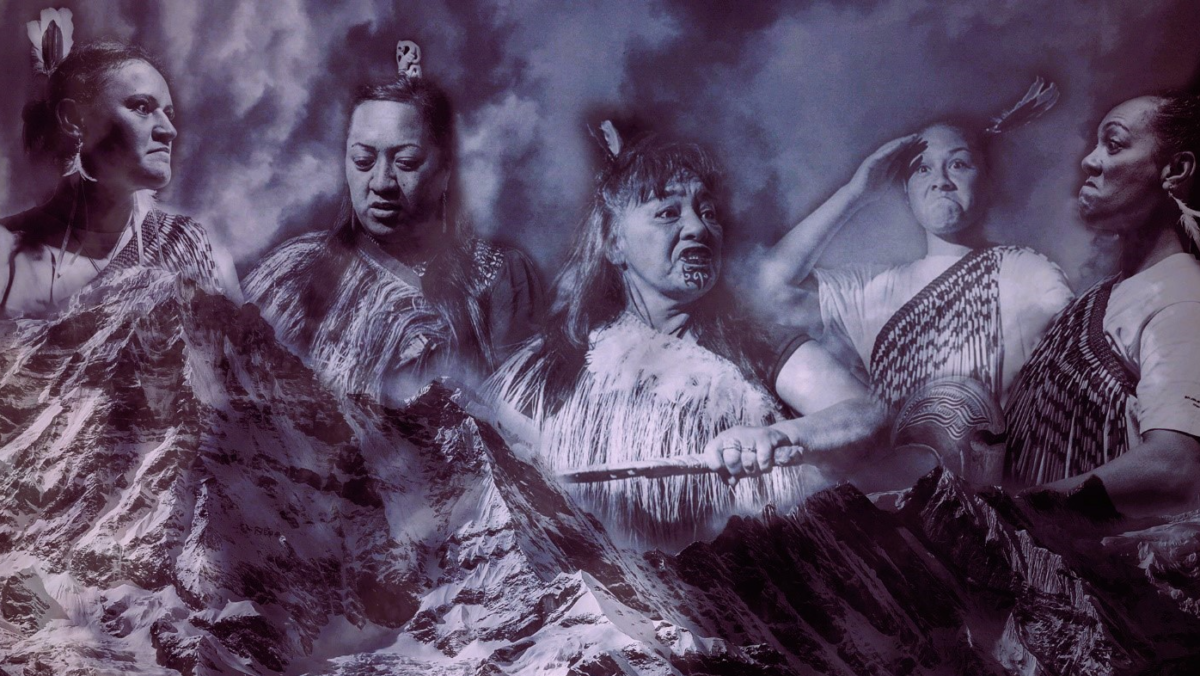Nuku and Black are forces to be reckoned with, both in nursing and their respective iwi. Nuku is a midwife and hails from Tainui, Ngāi Tai and Ngāti Kahungunu. Black is a nursing manager at a hospital and hails from Ngāi Tūhoe, Whakatōhea, Ngāti Kahungunu and Ngāpuhi.
The two roles have come out of NZNO’s commitment to Te Tiriti o Waitangi and its mission to not only promote nursing and midwifery but also improve the health status of all peoples of Aotearoa New Zealand. Māori life expectancy is seven years lower than non-Māori and they are more likely to suffer heart disease, cancers, diabetes and mental health issues.
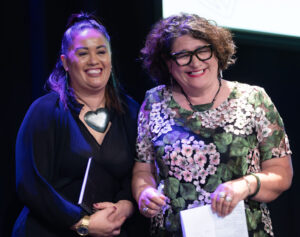
NZNO is the country’s biggest health union with 63,400 members who are nurses, midwives, health-care assistants and allied health professionals. Of those, around 4000 are Māori.
Like the NZNO president, the kaiwhakahaere is a governance position and must be across the entire organisation as well as lead Te Rūnanga o Aotearoa, the tāngata whenua arm of NZNO. The tumu whakarae supports the kaiwhakahaere.
Since the coalition Government came to power in late 2023, it has launched a series of attacks on Māori. These attacks have been on Māori language and identity, on Māori rights to self-determination and sovereignty and – of most concern to Nuku and Black – on policies to reduce health inequities and reduce inequality.
“Right now we should be pushing for safe staffing ratios, especially culturally safe staffing ratios, and retaining and building our workforce but this coalition Government is making it impossible for us to progress those things,” Nuku said.
‘There’s aren’t many initiatives that are fit for Māori, fit for purpose in the current health system but this Government is mutilating them.’
“The focus for Te Rūnanga for the rest of the year is to fight these attacks because they are taking Māori health backwards, they are taking the health of the entire nation backwards.”
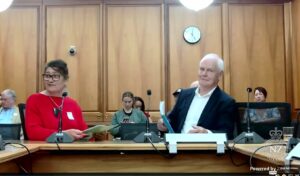
Fighting proposed legislation
Both Nuku and Black hit the ground running in the first two weeks of the year, to get submissions across the line on two controversial proposed laws.
“They snuck in a paper on their proposed Regulatory Standards Bill the first week of this year, while many people were still in holiday mode, but we managed to get a submission in on that.”
‘All nurses, not just Māori nurses, should be scared about the proposed RSB because it has the potential to undermine the mana of our profession, to deregulate us, to replace us.’
In January, Te Rūnanga also managed to speak to the Principles of the Treaty of Waitangi Bill which would remove the current principles and replace them with others that would undermine the spirit of the treaty, Nuku said.
“That Bill is relevant to every nurse, in hospitals and in communities, because if those principles are removed, it will cost more patient lives. That loss will start with Māori lives, but it will eventually reach non-Māori too.”
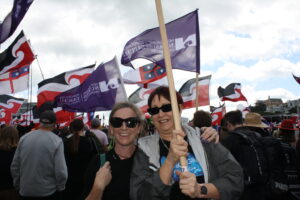
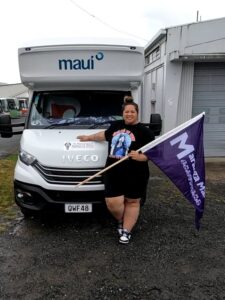
Walking the talk – showing face
Black spoke about Te Rūnanga also joining a hīkoi of about 100,000 people to Parliament in November last year. She and Nuku mobilised hundreds of members in the regions to show up at the hīkoi as it travelled down the North Island to Wellington.
It was the largest political rally in the nation’s history, led by Māori in opposition to the Principles of the Treaty of Waitangi Bill. It saw New Zealanders of all ethnicities and religions stand together.
‘In te ao Māori, emails and letters and texts don’t work. To be taken seriously, you need to show up so the people can see your face, see you walking your talk so that’s what we as Māori nurses, as NZNO did.’
“Several of our members even took a week off work to be part of the hīkoi. Te Rūnanga is very much about kotahitanga or the unity of people as a way to create change, so we needed to be there.”
Only a week before the hīkoi arrived in the capital, Te Rūnanga helped to build momentum for it by organising a rally at Parliament to speak out against the attack on Māori and on health.
Showing up at other annual key events in te ao Māori was also important, Nuku said.
“Delegations of Te Rūnanga have attended every event in the Māori calendar so far this year including Ratana and Waitangi. It’s important we stay connected, and that we are visible to not just our patients but the whānau and iwi they come from.
“Being present at these events allows us to hear their realities, their concerns with the health system and that helps to inform what direction we need to be taking,” Nuku said.
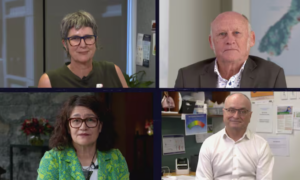
Turning up the volume on Māori health
Through all the submissions, hīkoi and rallies, Te Rūnanga has taken every option to voice its concerns on other decisions the Government has made that are hurting Māori health, Nuku said.
‘It seems this Government is firing a missile at Māori, at health at least once a month. I’ve never spoken with as many media in my life as I have since this Government got into power.’
“We’ve spoken out against its decision to chop Te Aka Whai Ora, an agency set up to give Māori oversight of the health services delivered to Māori.
“We’ve spoken out against them reversing attempts to increase Māori clinicians in medical schools and reducing clinical measures to target and promote Māori access to surgery, despite clear evidence that Māori are not accessing sufficient surgical treatments to meet their needs,” Nuku said.
“We’ve spoken out against its decision to scrap a long-term internationally acclaimed programme to reduce smoking and even promoting tobacco lobbyists to Cabinet.”
Tobacco is a leading cause of death for Māori.
Te Rūnanga has also voiced its opposition to the Government tampering with a screening programme for bowel cancer for Māori despite evidence that the programme has saved lives.
“This is just what’s happening in the health sector. I haven’t even got to the list of things they are doing across other sectors like housing, social issues, civics and justice,” Nuku said.
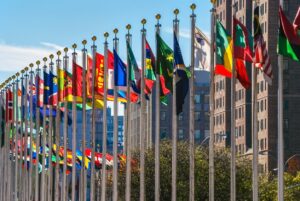
Sending an SOS to the UN
Next month Nuku, and NZNO primary health-care nursing leader Tracey Morgan, head to the United Nations in New York. It is not their first time there, but it will be the first time they, with the support of the Global Alliance of Indigenous Peoples, ask the UN to take action by sending an investigator to Aotearoa.
‘We will be appealing to the UN to send a Special Rapporteur on Human Rights to Aotearoa. If they can’t stop this attack on us, then at least they can let the world know what’s happening to us.’
While in New York, Nuku and Morgan will be telling the in-depth story of the attacks on Māori, in an intervention workshop.
“We have only three minutes to tell the story to the main assembly. Attendees who want to know more, can come to a side-event we have planned.”
The last time a UN Special Rapporteur came to Aotearoa was in 2005 when the then Government stopped Māori from accessing the courts to have claims heard to the ownership of the foreshore and seabed.
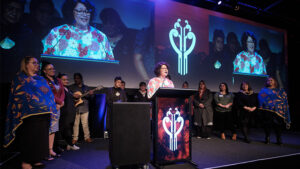
Making cultural the norm and keeping Māori nurses safe
At Waitangi earlier this year, Te Rūnanga launched its report on cultural safe staffing ratios and why it matters.
“Too many Māori people, in the past and right now, have had terrible experiences in the health system due to institutional racism.
“This leads many Māori to not access health services, and they end up sicker or dead – that’s the reality and it will continue until the system supports the introduction of culturally safe staffing ratios, which shouldn’t be seen as an ‘add on’ but as essential.”
Nuku and Black were also concerned about the safety of Māori nurses, midwives and health-care workers.
“It’s so hard to be Māori right now. There are so many spaces where its unsafe to just be Māori. So we are looking at how we can help them with that, help them get through,” Black said.
“We have an annual event called the Indigenous Nurses Conference in August, where hundreds of Māori nurses can come together and share their concerns and look at solutions, but we are looking at other things too.”
At the last conference, the members received an enlightening kōrero from Kura Moeahu – a rangataira of Taranaki whānui in Wellington.
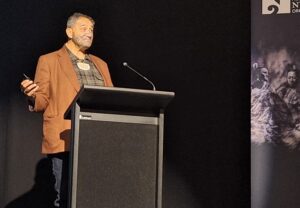
“I see in our hospitals, GP clinics and in the community, that our nurses are burnt out. All our nurses – Māori and Pākehā. I believe in wairuatanga [spirituality]. I believe that karakia can calm us, that it can re-energise us,” Moeahu said.
“It can’t take away all our problems, but it can give us clarity. Find the time and space, even if its during what little break times you have, even if it’s in the storeroom. Karakia koutou mā.”



